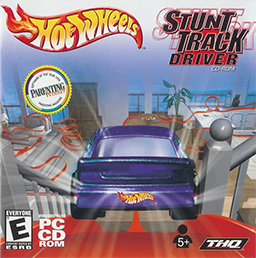Related Research Articles
RuneScape is a fantasy massively multiplayer online role-playing game (MMORPG) developed and published by Jagex, released in January 2001. RuneScape was originally a browser game built with the Java programming language; it was largely replaced by a standalone C++ client in 2016. The game has had over 300 million accounts created and was recognised by the Guinness World Records as the largest and most-updated free MMORPG.
Racing games are a video game genre in which the player participates in a racing competition. They may be based on anything from real-world racing leagues to fantastical settings. They are distributed along a spectrum between more realistic racing simulations and more fantastical arcade-style racing games. Kart racing games emerged in the 1990s as a popular sub-genre of the latter. Racing games may also fall under the category of sports video games.
Micromanagement in gaming is the handling of detailed gameplay elements by the player. It appears in a wide range of games and genres, including strategy video games, construction and management simulations, and pet-raising simulations. Micromanagement has been perceived in different ways by game designers and players for many years: some perceive it as a useful addition to games that adds options and technique to the gameplay, something that is necessary if the game is to support top-level competitions; some enjoy opportunities to use tactical skill in strategic games; others regard it as an unwelcome distraction from higher levels of strategic thinking and dislike having to do a lot of detailed work. Some developers attempt to minimize micromanagement in a game's interface for this reason.
Tactical role-playing games, also known as strategy role-playing games and in Japan as simulation RPGs, are a video game genre that combines core elements of role-playing video games with those of tactical strategy video games. The formats of tactical RPGs are much like traditional tabletop role-playing games and strategy games in appearance, pacing, and rule structure. Likewise, early tabletop role-playing games are descended from skirmish wargames such as Chainmail, which were primarily concerned with combat.
The following outline is provided as an overview of and topical guide to video games:

Autoduel is a role-playing video game published by Origin Systems for the Atari 8-bit family, Commodore 64, Apple II, and IBM PC compatibles in 1985. It was released in 1987 for the Atari ST and in 1988 for the Amiga and Macintosh. The game is based on the Steve Jackson Games series Car Wars.

rFactor is a computer racing simulator designed with the ability to run any type of four-wheeled vehicle from street cars to open wheel cars of any era. rFactor aimed to be the most accurate race simulator of its time. Released in November 2005, rFactor did not have much competition in this market, but it featured many technical advances in tire modeling, complex aerodynamics and a 15 degrees of freedom physics engine.
Turn-based tactics (TBT) is a video game genre of strategy video games. They are turn-based simulations of operational warfare and military tactics in generally small-scale confrontations as opposed to more strategic considerations of turn-based strategy (TBS) games. Turn-based tactical gameplay is characterized by the expectation of players to complete their tasks using only the combat forces provided to them in a generally realistic manner.
Real-time tactics (RTT) is a subgenre of tactical wargames played in real-time, simulating the considerations and circumstances of operational warfare and military tactics. It is differentiated from real-time strategy gameplay by the lack of classic resource micromanagement and base or unit building, as well as the greater importance of individual units and a focus on complex battlefield tactics.

Metal Saga, known in Japan as Metal Saga: Sajin no Kusari, is a post-apocalyptic role-playing video game developed by Success and published by Atlus and Success.

G-Police is a 1997 combat flight simulation video game developed and published by Psygnosis for PlayStation and Microsoft Windows.

Hot Wheels Stunt Track Driver is a racing video game developed by Semi Logic Entertainments and published by Mattel Media for Microsoft Windows. It is based on the Hot Wheels toy franchise, and was released on October 15, 1998. A Game Boy Color version, developed by Lucky Chicken Games, was released in 2000.

Pursuit Force: Extreme Justice is a vehicular combat/shooter video game developed by Bigbig Studios for the PlayStation Portable, released in 2007. It is the sequel to Pursuit Force. A PlayStation 2 version was announced, but never released.
Vehicle simulation games are a genre of video games which attempt to provide the player with a realistic interpretation of operating various kinds of vehicles. This includes automobiles, aircraft, watercraft, spacecraft, military vehicles, and a variety of other vehicles. The main challenge is to master driving and steering the vehicle from the perspective of the pilot or driver, with most games adding another challenge such as racing or fighting rival vehicles. Games are often divided based on realism, with some games including more realistic physics and challenges such as fuel management.

Darkfall was a massively multiplayer online role-playing game (MMORPG) developed by Aventurine SA that combined real-time action and strategy in a fantasy setting. The game featured unrestricted PvP, full looting, a large, dynamic game world, and a player-skill dependent combat system free of the class and level systems that typify most MMORPGs. Darkfall had a 3D world environment and contained mild violence. The official Darkfall servers were closed on 15 November 2012.

Dead State is a turn-based survival horror role-playing video game developed by DoubleBear Productions and Iron Tower Studio set in a zombie apocalypse scenario. Players are tasked with leading a group of survivors living in a shelter in the fictional town of Splendid, Texas. Dead State was released in December 2014 after having been in Early Access since spring of that year. DoubleBear Productions continued to work on the title and in May 2015 released an "enhanced edition" which changed the name to Dead State: Reanimated.
This list includes terms used in video games and the video game industry, as well as slang used by players.

Crossout is a free-to-play pay-to-win vehicular combat video game focused on building and driving custom vehicles in PvP and PvE scenarios. It is developed by Targem Games and published by Gaijin Entertainment for Android, IOS, Windows, PlayStation 4, Xbox One and Xbox Series X/S. As of 2021, PlayPark, a part of AsiaSoft acquired the game's server of Asian territories.
References
- ↑ "Darkwind: War on Wheels - Patch Notes". Archived from the original on 2007-10-18.
- ↑ Redfern, Sam. "New Tutorials - seeking ideas/help". Darkwind: War on Wheels.
- 1 2 Williams, Andrew (2008-11-07). "Darkwind: War on Wheels review". Bytten.
- 1 2 Wuerthele, Michael (2008-07-19). "Darkwind: War on Wheels". Inside Mac Games.
- 1 2 3 Skaar, Andrew (2008-05-31). "Indie Game Round-Up [May 2009 edition]". Gametunnel. Archived from the original on 2009-06-21. Retrieved 2009-12-27.
- 1 2 "Bytten Ernie Awards 2009". Bytten.
- ↑ PC Gamer UK, January 2010 edition. Future Publishing. December 2009.
- ↑ Lieberman, Joseph (May 7, 2009). "Dark Wind review by Gametunnel". Gametunnel. Archived from the original on July 16, 2009. Retrieved December 27, 2009.